The straight back and distinguished greying locks, with just a hint of a quiff, are a reassuring sight to music-lovers in Azerbaijan – when Rauf Abdullayev takes up the baton, audiences know that an evening of fine music is in prospect. Chief conductor and artistic director of the Azerbaijan State Symphony Orchestra, holder of the title People’s Artiste and winner of a State Prize, Professor Rauf Abdullayev talks to Jeyran Bayramova about conducting in Azerbaijan and shares his memories of some of the country’s best composers.
You are considered a pioneer of conducting in Azerbaijan. Could you tell us a little about the history of classical music in the country?
The foundations of Azerbaijani classical music were laid by our outstanding composer Uzeyir Hajibeyov. After that, Azerbaijani conducting was developed further by Niyazi, Fikret Amirov, Qara Qarayev (Gara Garayev), Arif Melikov and Khayyam Mirzazadeh.
In February Baku holds a youth festival of classical music, where young composers and performers contribute to the development of Azerbaijani conducting too. At the same time I do my utmost to make my contribution. Mainly I try to have Azerbaijani music played outside the country. I am very happy when we are asked to send our music abroad. Every year, our orchestra gives concerts in various countries, performing works by Azerbaijani luminaries. Recently we were in Ankara, Turkey, where we performed music by Qara Qarayev. Also we gave a concert in honour of the 90th anniversary of Niyazi’s birth. Then we played in the Mstislav Rostropovich International Festival, which was held in Baku in May.
WORLD PREMIERES
How do you view your work with Niyazi? When you returned from Leningrad to Baku in the 1960s, it was difficult for you to make a breakthrough. Niyazi dominated the cultural scene at that time.
From 1968 I was the principal conductor at the Opera and Ballet Theatre, but I was often invited to the Philharmonic to attend all kinds of congresses and plenums of Azerbaijani composers. I conducted the world premieres of several works by different composers. They included Symphony No. 6 by Arif Melikov, Symphonies No. 2 and 3 by Khayyam Mirzazadeh as well as pieces by Faraj Qarayev and many others. In the Opera and Ballet Theatre I also performed works that had not been staged before, including the operetta Deceived Star by Mammad Quliyev, the operas The Fate of a Singer by Jahangir Jahangirov and Aygun by Zakir Bagirov and many others. After the death of Niyazi, I was invited to become the principal conductor of the Philharmonic in 1984. And I’ve been here ever since.
Have there been many changes at the Philharmonic over the years?
Well, famous Russian conductor Nikolai Anosov was closely involved with the emergence of the Philharmonic in the cultural life of Azerbaijan. Uzeyir Hajibeyov invited him to Baku in 1938, where he conducted at the Philharmonic and taught at the Conservatory. Anosov managed to assemble an excellent team of musicians who laid the traditions of the Philharmonic. Our outstanding Niyazi built on those foundations for many years. However, because of serious illness in the latter years of his life, Niyazi could not cope with all his responsibilities, so the Philharmonic lost a great deal. When I came to the Philharmonic, I primarily tried to restore the team of musicians who had been famous in their time. I also continued to perform world premieres of a variety of works. In all, I’ve got a list of 230 compositions that I’ve conducted at the Opera and Ballet Theatre and the Philharmonic.
CONTEMPORARY MUSIC
Qara Qarayev played an important role in your life and work as well. In his last letter to you, written shortly before his death, the composer urged you not to give up. What did he mean by that?
He certainly did play a big role. In that letter he was talking mainly about the performance of contemporary music. It didn’t always go down well here. For example, while a violin concerto by Qara Qarayev might be well received in Moscow, it would not meet with approval here in Baku. At that time I was principal conductor at the Opera and Ballet Theatre, and I remember that the Opera and Ballet Orchestra had to play one of those concertos. There were certainly problems at that time with contemporary music, but later things changed and became easier. Faraj Qarayev and I created the Qara Qarayev Festival of Contemporary Classical Music, which has recently resumed after a brief hiatus. All music is entitled to its audience, and will reach it eventually.
Your repertoire is vast and diverse. You perform music from different eras and styles. You have appeared in concert halls around the world. What do you think is the difference between an Azerbaijani audience and, let’s say, a French or British one?
I would not say there is much difference. There the audience listens attentively and here the audience tries to capture the music. I would not categorise the audience by geographic or national criteria. Every piece of music has its own audience; it’s the same in France or Azerbaijan, it doesn’t matter.
By the way, Azerbaijani music is always received with great warmth and enthusiasm abroad. I remember one of our concerts in Germany, where we played pieces by Qara Qarayev, Arif Melikov and Faraj Qarayev; the audience was hugely delighted. They were surprised that there is such great music in Azerbaijan.
Have Azerbaijani audiences changed? Let say, since the 1980s?
Yes, they certainly have changed. During Soviet times, few people came to classical concerts. Now the audience is more educated and more demanding.
Do you agree that young people today don't know how to behave at classical concerts and often violate the dress code?
I don’t know. There are certainly individual cases, but they happen everywhere, not just here in Azerbaijan. The main thing in an audience is, I believe, their disposition and genuine desire to listen to classical music. It would be good if the students at music schools came to concerts, because they are the future generation of musicians.
TIME FOR DEVELOPMENT
Do you think the question of inculcating a sense of beauty in the younger generation, a general aesthetic education, is important today?
I think it is very serious. The problem as I see it is, among other things, a lack of professional educators. After all, what did Uzeyir Hajibeyov do in his day? He invited many talented teachers from abroad. Remember how many distinguished professors he invited to Baku from Russia! And all so that they would properly teach our young people and instil a taste for classical music. They produced a generation of violinists, cellists, trumpeters, horn players, etc. These people have worked here for a long time. Clearly, it's time to invite music professionals here again. We need a good school. Of course, we have great young talents successfully representing our country at various music venues. But our school needs to follow Western standards.
No less urgent is the problem of how to help Azerbaijani musicians fulfil their potential. They have to look for jobs in different places, because the salaries are so small; in a word, they have to run from one place to another and that ultimately affects the quality of their performance. Many prefer to play for the military orchestra under the Ministry of Defence just because the salary is twice as big.
CHANGING BAKU
What does Baku look like in your imagination? Does it correspond with the reality today?
Indeed, the city has changed. There are fine buildings, good infrastructure, but it seems to me that there are too many tall buildings, which somehow ruin the image of Baku. Recently I was on Gorkiy Street near the music college that I used to go to. I didn't recognise the street because of the huge walls, which seem to crush you. I don't think these kinds of buildings should be built in the city centre, they should be constructed somewhere on the outskirts. But overall Baku has turned into a very modern and beautiful city. No wonder foreign visitors enjoy coming to Baku.
Do you agree that as cities change the people living there change too? You live in this city…
Yes, I do. There are many visitors, IDPs and refugees who have not been able to integrate into the urban lifestyle in Baku. And this is the consequence of the Karabakh conflict. But these people can also be understood; they are not to blame, because they did not choose to come here. I think everything will fall into place in time. It takes time for people to get used to city life in all its manifestations.
RESPECT FOR ELDERS
They say it is easier to be a hero than a man. What should a man be like in your understanding? What moral values of the Azerbaijani people do you think will last forever?
I think a man must be honest in his life and work, first of all to himself. Besides, as it seems to me, some subordination between younger and older generations should be respected in society. In the West there is a lack of that subordination. Everything is too democratic there. Certainly, there should be equality in society, but not at the expense of a lack of this subordination. Our values are laid down in our mentality.
What makes us Azerbaijanis? What is at the root of our mentality?
It's difficult to say. We are all people.
Well, let's say, some consider us a nation more oriented to the East than to the West and Europe. For example, we are often criticised for not saying what we think.
Hmm…well, sometimes it is better to hide one's thoughts and emotions. It’s called diplomacy, isn't it? (smiles)
KARABAKH CONFLICT REQUIRES POLITICAL SOLUTION
How do you connect concepts of morality and patriotism?
It's quite difficult to follow both morality and patriotism at the same time. If I consider the Nagorno-Karabakh conflict, then I would rather follow patriotism more closely. For example, I consider Aram Khachaturian, who was born in Tbilisi, Georgia, a very talented Armenian composer. I remember that in 1968 I staged his ballet Spartacus at the Opera and Ballet Theatre in Baku. He even attended rehearsals and the premiere. And we had good relations at that time. His violin concerto is very good, but I think it is impossible for me to conduct his compositions while our territories are still under Armenian occupation. I don't even contemplate it.
So you do not accept public diplomacy where art and culture could be considered tools to solve the conflict?
You know, we have already had some attempts at public diplomacy to resolve the conflict, but they did not succeed. If those attempts had been made at the start of the conflict, then they might have worked. But now I don't think they will work…I can see only the political way to resolve the conflict.
I'm originally from Karabakh, from Shusha. In my childhood I often spent my summer holidays there and I can see everything as though I were there now. We shouldn’t accept the loss of our lands. We shouldn’t!
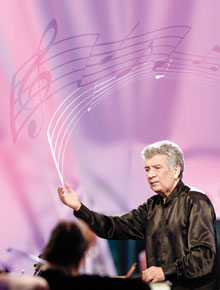
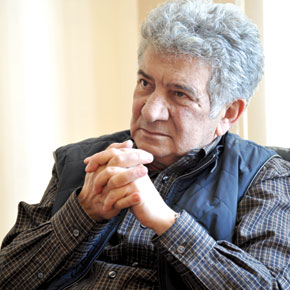
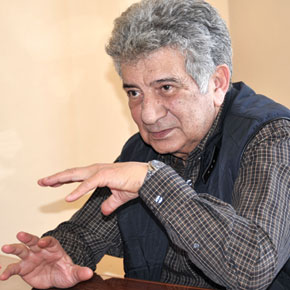
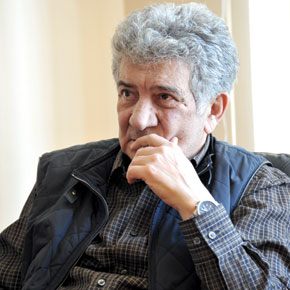
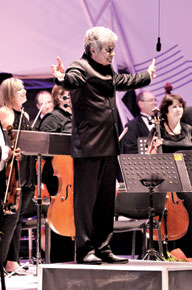

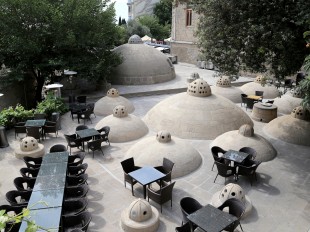
.jpg)